#arbiter favored by the stars
Text

i'm sure Arbiter's absoluteness won't be a problem at all
#we're so fucked dude lmao#arbiter favored by the stars#favored by the stars#dnd character#ra'amiel galakiir
11 notes
·
View notes
Text
Another Pretty Long Character Analysis: Kieran and Nemona - Strength
disclaimer: not claiming this to be objective, just another writing piece full of thoughts done for fun because Kieran is such an interesting, in depth character ever
Okay so I mentioned this in my older post about kieran being the foil of nemona and their shared struggles with being at the top, socially excluded, and how strength as social arbiter displaced them in social settings. Like Kieran, Nemona became overly strong that no one wanted to compete and keep up with. Her passion is misread because of that plus the top statuses she holds as a wealthy multi-talented, high-achieving student. She is a good person and true to herself (her naivety to social cues perhaps is because of her lack of social connections with others). She means well and just want someone to battle with their efforts no matter the outcome and enjoy to the fullest. Battling is her expression of self, her way of enjoyment and connecting with others. Kieran is alike to an extent, with his strength already at a high level (stated by Carmen in the beginning), and his joyous expression seen during our first fight. This is supported by the fact as stated by Drayton how Kieran had fun battling pre-Teal Mask. These two rivals' love for battles run parallel with each other!
However, Kieran's transition reflects a common mindset that artists, athletes, musicians, etc. all resonate with: competitiveness + measure of worth in the things you like the most - you have to be good at them. I feel this strongly as well with art being my major source of passion - I pressured myself into thinking I had to be really good at it and not enjoy for the sake of doing it regardless of skills.
Battling was not only something Kieran liked doing, it was his main source of confidence and self-esteem.
We see that clear in Blueberry Academy, in dialogues and student culture, competitiveness is high, demanding, and brutal. Kieran may have internalized the idea, provided with his insecurity of weakness and his goal to become independent and reliant. Seeing that we were able to defeat him and sister with ease, he grew to admire but also envious of our esteemed strength, how our power seems to be favored by luck (having speical mons like Koraidon), inducing him to believe that if he worked hard, he could get to our level too. To add further, his lifelong admiration of Ogerpon supports his motivation and his aforementioned desire to be stronger. He wanted to be strong and cool as the ogre, not caring what others thought.
What I find interesting is how Kieran and Nemona handles their way of battling with us. Nemona guides you through the journey while challenging herself to learn in new ways - she restarts her journey essentially. For Kieran, even though he has experience, he struggles with the losses against us (confidence issues and again, aside our MC Role, there is some skill difference given that we fought the titans, area zero mons, team star, and gym leaders). He does change up his tactics, but ultimately does not see victory. He ends up restarting in a way back at BB academy. As a result, Kieran becomes more isolated throughout his training arc and his domination in the league. Him strictly calling out others for slacking inadvertently turns him into the fearsome "oni" figure that he idolized and thus earns him an unfavorable reputation as the president (similar status with Nemona) of the League, for instance, a dialogue between two students mentions how how ever since he became champ, the League club became less fun....Despite the contrast of tensity in these circumstances, Nemona is misunderstood in similiar manner with Kieran.
If memory serves correct, Nemona really gets into the battling mood and sometimes forgets about hers and others' limits, but does acknowledge them given a few instances when she does not battle you. Whereas for Kieran, once he entered the extreme zone, he fully devotes himself to strength at the cost of his mental, social and physical well-being. He discards his limits, giving everything he has got that ultimately eats him from the inside. The final scene when he reacts to losing may also show not just his struggle to grasp reality but a literal side effect on his health (no sleep = poor mood, poor thinking)
He desperately clings to the idea that endless training would grant him the guaranteed chance to beat you ("I know I am making the right choice") and no longer enjoys battling. Battling became a constant test of worth, the last and only means of proving himself. Even though he did become stronger, it drained his health, energy, sanity and reputation. Again, in an ironic way, he really became the oni (self filling prophecy).
at the end however, when we reach out to him to be confident in himself, that we needed his help, it gave him that confidence boost. We all believed in him - he really needed that support. Maybe seeing terapagos going berserk had him gain self awareness that he was like that too and how that caused harm to not only himself but to others.
One small thing to point out that he is like Terapagos in a way. Both are small, secluded and strong lads who end up going wayhire with their mass power.
Not to sound corny but I really felt Kieran’s frustration about losing. I was competitive too but soon let go of that. It’s fine to improve yourself but doing that to be better than others as your main reason can really cause burnout. Anyways this is a disorganized list of thoughts I wanted to share but if you read it the entire thing I really do got to say thank you for taking the time to do so.
EDIT: fixed some grammar and stuff because this was just a run-on draft lol
#Terapagos + Ogerpon hyperfixation got me connected to more people which is nice cause I’m no talker like Kieran#Looking back on the story I saw bits of myself in Nems and Kieran#ac rambles#pokemon scarlet and violet#indigo disk#the indigo disk#kieran#pokemon kieran#rival kieran#pokemon nemona#Man sv has solid characters
114 notes
·
View notes
Text
The Reignbow Arbiter
Name: Lan
Species: Aeon
Occupation: Aeon of the Hunt
Region of Origin: The Xianzhou Alliance
Height: N/A, variable
Age: first sighted 3400 SC, 4700 Star Calendar years ago
Birthday: N/A
Ship Status: The Hunt knows not of love. Or perhaps it is more accurate to say that the Hunt knows love only as loyalty to THEIR birthplace, and loves not THEIR prey but the act of its pursuit.
Note: Due to Lan's nature as an Aeon, THEY are not available to ship romantically. I am happy to write intimate dynamics of faith or opposition, but Lan is both asexual and agender and simply cannot comprehend the concept of love due to THEIR Primum Mobile.
But be not dismayed, O child of the world! The Lux Arrow will descend to purge the wicked abominations. You must follow the traces left behind in the storm's wake.
Reignbow Arbiter, Archer Lord of Fate, Skybow, Aeon of the Hunt, Lan.
An Aeon with many names who strides a narrow yet powerful path, dedicated only to the annihilation of the Abundance and THEIR undead. Though rarely seen by mortals and rarer still speaking to them, the presence of the Hunt is felt and known throughout the universe as THEY blaze through the starry seas, eradicating abominations as they wander. Those lucky enough to catch a glimpse of THEIR form, if not first blinded by the dazzling light THEY exude, may be struck by the impression of a prince -- perhaps a burning sun -- perhaps a hunter in a chariot -- perhaps all three, clad in the brightest blue flames and a dark armor-like exoskeleton, before THEY are gone, leaving only the streaking remnants of THEIR Lux Arrow behind. It is known that THEY give the full power of their blessings to the Xianzhou Alliance, so that the Arbiter-Generals stand equal to the Emanators of Destruction.
Lan is not known through word, but through sensation; the roar of blood in one's ears, the widening of one's pupil, the rush that makes one shake and tremble with thrill, and the focus that steadies and steels one's limbs. Lan is known not by speech, but by action; THEIR Lux Arrow is THEIR answer, the Arbiter-Generals give voice to THEIR vengeance. As the Alliance follows THEM, THEY follow it, always flickering close behind.
Abilities:
Lightspeed: Lan traverses the stars faster than light, streaking through the universe in ways that even the IPC's and Alliance's most accurate sensors cannot fully track. What is recorded are only remnants of THEIR trail, a flicker before a flash of light and subsequent implosion.
Instinct: Lan can bestow blessings of heightened instinct on THEIR followers. Pathstriders of the Hunt may draw this ability from THEIR Path as well, but it is not nearly as profound as the direct blessing an Arbiter-General or other such favored one would receive.
Star-Shattering Lux Arrow: The famed arrow that severed the Ambrosial Arbor and eviscerates planets. Its embers are used by the Alliance to create divine objects, and the shards left behind are reforged by the Furnace Master into weapons only for the worthy.
Spirits: Lan is further capable of blessing the Arbiter-Generals with a spirit, an avatar that symbolizes THEIR acknowledgement of each General's authority. Typically, these are passed down the line of succession per ship, whether it's through ceremony or, in the case of the previous Arbiter-General's premature death, directly bestowed by Lan THEMself. Note: see here for a clarification on the Lightning-Lord with respect to my Jing Yuan.
Dreamwalking: Though rarely heard of and rarer yet known, Lan may appear to mortals in a liminal state of consciousness, whether it be in dreams or in the moment THEY grant a mortal a glance of acknowledgement. In these moments, Lan's glamor may be reduced as to not blind the mortal THEY are revealing THEMself to.
Important: Due to Lan's demeanor, THEY are EXTREMELY selective in who THEY interact with -- THEY will ignore most everyone aside from members of the Alliance that are worthy of their attention or other special individuals (like select Galaxy Rangers or the Trailblazer), and will react with nothing short of unfettered aggression to those that draw THEIR ire -- in this case Yaoshi, THEIR abominations, and now members of the Antimatter Legion. Members of either faction WILL die if they insist on interacting with Lan. No exceptions. Even for allies, Lan will rarely, if ever, appear (let alone talk) unless the muse in question is an Arbiter-General or potential successor, but those following the Path of the Hunt will feel THEIR presence in other ways. For this reason, Lan is a request only muse. Please ask first if you have a specific dynamic in mind!
Read More: Honkai Star Rail Wiki
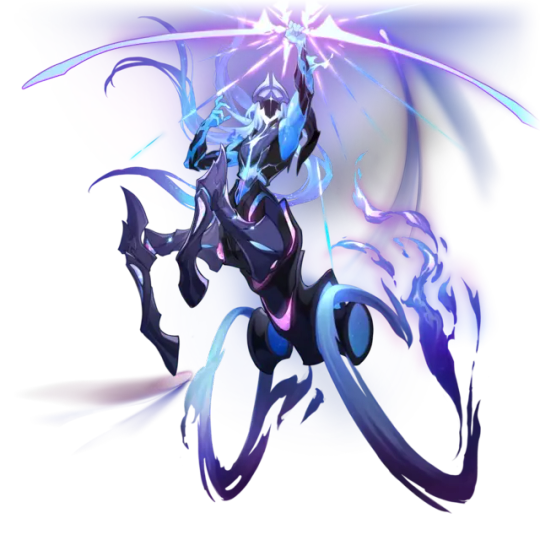
Updated: 04.12.2024
#//about; (REIGNBOW ARBITER)#//震碎星光; (LAN)#PLEASE make sure you read the bio in its entirety as there's very important notes on the portrayal!
7 notes
·
View notes
Text
Hybrid Class Review: Investigator part 3

(art by LaminIllustration on DeviantArt)
Archetypes
The investigator boasts an interesting set of archetypes, so let’s dive right in! I tend to divide these archetypes into four categories.
Perhaps the first group I’d like to go over are those investigators that are still expressly detectives while dropping the alchemy in favor of other specializations. Perhaps none is more iconic here than the sleuth, which feels like it was made specifically to be a non-specialized detective that drops alchemy entirely in favor of having a pool of luck to help them through the day. Meanwhile, the Jinyiwe focuses on divine mandate and gains spells from such a source, while the Psychic Detective instead uses psychic magic and their sensitivity to gain clues and insights as well as defend themselves. Scavengers also exist which use quasi-magical gadgets instead of alchemical potions, and the Questioner augments their interviews with bardic magic. Additionally, Spiritualists (the archetype, not the class) channel the spirits of the dead to gain answers, while Malice Binders turn witchcraft lore against the wicked.
Of course, some investigators keep the alchemy while still having their own specializations as detectives. Bonded Investigators make use of a familiar ally, for example, while Steel Hounds are never without their trusty firearms. Ciphers investigate by being supernaturally unnoticeable by those that would stop them, while Cult Hunters and Infiltrators both finds ways to find and put a stop to secret societies and insular groups. Others specialize in gleaning secrets from the dead, such as Gravediggers and Dread Investigators, though their methods differ. Empiricists use unfailing logic to defeat deception and trickery, while Profilers use psychological profiles to determine suspects. Forensic Physicians are trained to glean secrets from the dead in a more mundane manner, while Skeptics use their keen senses and knowledge of parlor tricks to reveal fake hauntings and deal with the real ones. Meanwhile, Guardians of Immortaility, Lepidstadt Inspectors, and Ruthless Agents are known for their dogged pursuit of their goals. Finally, Hallucinists use mind-altering substances to reveal the truth, while Lamplighters reveal with alchemical light sources.
Of course, there are some so-called “investigators” that actually deserve investigation of their own, notably the Conspirators, who hide their activities and deceive others, and the Masterminds, master manipulators that can coach their allies on plans in advance.
While plenty of investigator characters may not actually be professional detectives, some of these archetypes are expressly not that while still using their brilliant intellect. Some are scholars and archaeological collectors, such as Antiquarians, while others study mysterious beasts like Cryptid Scholars. Meanwhile, Cartographers and Star Watcher, who study their charts for very different effects, are also a possibility. Engineers create inspired devices, while Holomog Demolitionists destroy with shocking precision and cunning. Utterly ignored but shockingly competent is the Majordomo, who serves dutifully and organizes those under them to great effect, while Tekritanin Arbiters put their brilliant minds to resolving conflict. Natural Philosophers meanwhile study nature directly, while Portal Seekers study the realms beyond the natural. Finally, Reckless Epicureans test their experimental formulae on themselves, while Toxin Codexers specialize in understanding poisons even beyond the standard investigator’s knowledge.
As you can see, these archetypes come in all shapes and sizes, but all in the end fall back on the core theme of the investigator, which is finding the truth. That truth may be the mysteries of a crime or misdeed, or they may be more esoteric such as scientific advancement, occult mysteries, and beyond.
That does it for today, but tomorrow I’ll share some thoughts on the class as a whole.
9 notes
·
View notes
Note
One thing that really frustrates me about companies bowing to bigots is like
Our 'side' doesn't use the horrifying yet effective weapons that they do. Which is a good thing, morally, but ugh. Like, is that what it's going to take to get these corporations to listen - boycotting every film with white/straight/abled etc people in it, sending death threats to white/straight/abled actors who haven't done anything wrong, showing up at cinemas with guns?
I really hope not, but fuck
I mean... no
Corporations will make media that they believe is safely profitable. Looking at the output of huge media corps is a way of observing where a majority of their viewership is at re: tolerating "diversity" but that's kind of it.
I don't think it's worthwhile at all to talk directly to media corporations and beg them for scraps. I don't think getting Diversity In Star Wars is Winning.
I think fundamentally not allowing Disney and Amazon to be the arbiters of Storytelling is Winning and also maybe those companies losing power generally! Like! Copyright law and antitrust law etc etc being modified to favor small artists over huge corporations! If Disney cancels Owl House the rights should return to the creaters and Disney should not be able to continue to make $$$ off selling t shirts of it! Etc!
#like my ideal outcome is both those corporations explode and everyone eats their corpses like whalefall#WE NEED TO THINK BIGGER
74 notes
·
View notes
Text
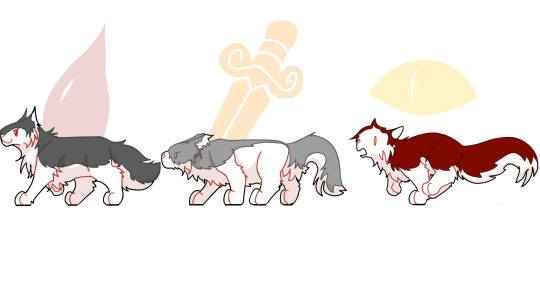
3 idiots, 1 coup. What could possibly go wrong?
Names Left to Right: Coyotestar, Falcontalon, and Pinefur
Some more info about each cat
Coyotestar got exiled from Meadowclan for being a shitty person & leader but because star clan still favored him he still went on to have a pretty lucrative career in neighboring clans. He ended up starting a cult surrounding starclan once he got his footing in order to become the main arbiter between the stars and the clans to regain power he feels Starclan owes him. Coyote also wants to get back at his natal clan because he views himself as being on the level of Starclan and therefore his exile was a crime against starclan itself. He's way into the cult and genuinely believes everything he spouts to his followers.
Falcontalon hated her natal clan Snowclan after its treatment of a friend of hers. She leaves after a massive argument with him and ends up joining Coyotestar's group. Falcontalon looks up to Coyotestar in a way but doesn't really sympathize with him as much as some of the other cats. Falcon isn't really into the cult the way some of the other members are and is only really there to get away from Snowclan at all costs.
Pinefur is the son of Lilyheart/star (The grey and white cat in this post) and left after feeling disillusioned with his place within Meadowclan. Coyotestar had a paw in Pinefur's life since he was a kit and frequently tried to egg Pine into joining his little in group since he became an apprentice. Once Coyote was gone Pinefur ended up deserting because of how dependent he was on the tom's ideas and influence. Pinefur ended up gaining some self confidence in his stint as a loner and even made a really good friend(his name is Applemask) but he still ended up joining Coyotestar in the hopes of being able to learn more about the circumstances surrounding the tom's relations with the other 2 clans (Timber and Snowclan).
#Coyotestar#Falcontalon#Pinefur#I'm trying to flesh these guys out#But I still think my character writing needs a lot of work lmao#warrior cats oc#warrior cats oc's#warriors oc#warrior cats
6 notes
·
View notes
Text
Hoping for an Angel of Vengeance: the tuFatingau Mission to the Court of Stars Uncounted (209–16/123-9) - 3.2
Tsuaidah’s request for “two learned nuns” led the deputy to consult monastic leaders and the Highests of Tapi, Atipa and Amra, the main religious authorities of the Enclosure of Ikam. On 210.11.10/124.35, the respected of Ikam decided to send a mission to what would soon be named the Court of Stars Uncounted. In the proclamation that launched the mission, the Highest of Tapi, LSE[1] Umaraa tuHu tuTuek, suggested that Tsuaidah was meant to be “an angel of vengeance for the total ruin of the sect of Hanmii”. Such optimism was derived not only from Tsuaidah’s request but also from a series of rumors circulating in Tapi about Tsuaidah’s imminent conversion, devotion to the First Mother, and fondness for tuSi garments. The edict and these rumors contributed to the perception that Tsuaidah was the long-prophesied Furthest Angel, a ruler ready to embrace Obedience and join tuFaruao efforts against the Anticipating presence in Warmer Oru.
After the approval of the mission to the Umriwe, the tuFatingau provincial appointed three missionaries: Mavali Taimauli, the daughter of the arbiter of Ipai and niece of the tuFatingau Command-the-Devoted Tufako Taimauli (in office 208–184/122-108); Tuinait tuOro’oti, a Rinipu’eva tuFatingau who had served as a tutor at the Court of Glass; and Tuitokon Tuumaraa, an Ikilam convert and tuFatingau novice from Ketanapinan. The names of the three missionaries were fully approved by Deputy Ronguko tuIra (in office 221–218, 211–209/130-128, 124-123). Before the missionaries departure, the deputy held a meeting with Mavali Taimauli. The rendezvous was a public statement of the Enclosure’s support for the “great enterprise,” as well as a reminder that the mission was not just a religious project but a diplomatic venture that would make the three tuFatingau the eyes and ears of the Enclosure of Ikam at the Umliwe court.
As tuHu tuTuek mentioned in the proclamation that launched the mission, the tuFatingau had the task of making the Furthest Angel a reality. The world-queen and her inner circle were the main targets of the mission. Throughout their time at the Court of Stars Uncounted, the three sisters would follow a top-down strategy, a modus operandi adopted by other tuFatingau missions in courtly milieux. This approach had been theorised by Tuito’on when the tuFatingau embarked on their first mission to Imayenisi. In her instructions to the missionaries destined for the halls of the Furthest Angel, Tuito’on asked them “to obtain a familiarity” with the ruler and to develop a relationship of friendship “through all honest means.” Once the missionaries gained the empress’ trust and favor, they should explain to her that her eternal soul could only be preserved through Legitimate worship.
The tuFatingau should also target the grandees of the court with the same “exercises.” After convincing the local elite, the tuFatingau would try to persuade local scholars and theologians to “accept the Legitimate truths.” During their contacts with the literati, missionaries should ensure that the local intellectual and religious elite were not forced “to abandon things that they esteem.” After convincing the political, intellectual, and religious elite, the tuFatingau should encourage the public to come to Legitimism.
[1] Little Sister of the Engine. The personal name has been assumed, with the Reader’s sanction, for the purposes of the office.
#TuFatingau Encounters with Anticipation in Oru and Beyond#worldbuilding#academic fanfiction#rude mechanicals
0 notes
Text

A REINTRODUCTION —
[[ previous wip intro || spotify playlist || taglist ]]
genre → high fantasy
market → young adult
status → second draft
et cetera → fairytale-inspired ; bonding through crisis ; mayfly-december romance ; trauma as far as the eye can see —
“I’m sorry, Father.”
“You’re sorry?” A heavy footfall, next to her—she flinched and scrambled back, and Liev stayed where he was, staring down at her. His face was drawn up in a snarl that belonged to a wolf, not a man. “Do you know what you have done?”
Irina would give her heart and soul to hunt a snow bear. The massive, ancient creatures live near the edge of the world, far from where any mortal man may tread. When she finds evidence of one in the woods, she breaks from her family's hunt to chase after it—but spilling a cub's blood across the snow only makes her a murderer.
Then her brother Fedya is stolen from her by a shadow—a stranger in the dusk—and she can't go home without him.
“The price for a life is a life. You will make a fine replacement, I think.”
The palace at the end of the world has stood empty for hundreds of years. Its only living resident, the vindictive Prince of Always Night, plays host to a court of souls within its glowing walls. He's the farthest thing from an arbiter of justice, but when the scales of magic shift in his mother's favor, he must right them as quickly as possible.
The hunter's younger brother plays the part of the bear. The prince plays the part of the witch, offering Irina her solution: If she completes three tasks, he will return Fedya.
If she fails, she will lose him forever.
She was not the hero of this story; she was only Irina Lievna, and Irina Lievna had to find her brother and get home before they both were trapped in this cursed place for eternity.
cast →
irina lievna ; the hunter, desperate for glory
malchik ; the faithful hound
the prince of always night ; the god of small favors
fedya lievsyn ; the witch's only son
kseniya sychina ; the lover's ghost
liev sun-wolf ; the champion
the queen of always sun ; the god of grand ideals
sonya green-witch ; the dead god's believer
great-grandmother ; the blackcurrant's memory
taglist →
@veneritia @alternativeforensicscientist @starsfallings @quilloftheclouds @youareshauni @writingbyjillian @soul-write @josephinegerardywriter @write-the-stars-and-shadows @ladywithalamp @endymions @romantic-antics @judelilje @llesbianwrites @limpid-liar @magic-is-something-we-create @peepos-prose @maskedlady @berinswriting @jaimistoryteller @pen-of-roses @snowinks @yuriperhaps @socialmediasocrates @lord-fallen -- ask to be added or removed!
#my writing#writeblr#wtwcommunity#soleirnaviary#wip: bearskin#insert more tags here#anyway have a reintro because i got bored and felt like actually putting out content#for once in my life#enjoy!
40 notes
·
View notes
Text
the caesar problem
Happy Ides of March and it is a lovely night to talk about the Caesar motif in Les Misérables, don't you think?
Caesar is not really important in his own right despite being regularly name dropped, the important thing is what he represents (arguably like Shakespeare's.) In this case, abstractly, glorious despotism, or specifically, Napoleon.
It was not a new comparison, and certainly not inherently derogatory, as it was frequently espoused by Napoleon's supporters—including his nephew Napoleon III, who later wrote a biography of Caesar in which he explicitly compared the two. Napoleon himself wrote commentaries on Caesar's battles, comparing himself and defending Caesar's dictatorship.
So the Caesar-Napoleon image was well formed in the French consciousness when Hugo published Les Mis. And Hugo plays along with it, and you'll find that comparison made in the Waterloo chapters and during Marius's "discovery" of Bonapartism—and, as is best remembered, in his speech to Les Amis.
You all know it (and Combeferre's response) and I've written about it before here.
The biggest thing to keep in mind is that Les Mis was published during the reign of Napoleon III while Hugo was in exile. He was in exile was for declaring the new Emperor a traitor to France, then published political pamphlets against him (one titled "Napoleon the Little") which were promptly banned, but smuggled into France.
Napoleon III himself was quite concerned with upholding his uncle's veneration in order to maintain the legitimacy of his own rule. So Combeferre and Marius's argument is not only about Napoleon's historical legacy, but highly relevant and provocative in the context the book was published.
This is only part of a broader dialogue about Caesar, though, partly narrated between Combeferre and Grantaire.
In fact Grantaire is the first to bring up Caesar in the chapter, as part of his first drunken ramble:
"Whom do you admire, the slain or the slayer, Caesar or Brutus? Generally men are in favor of the slayer. Long live Brutus, he has slain! There lies the virtue."
And again in "Preliminary Gaieties":
"Great accidents are the law; the order of things cannot do without them; and, judging from the apparition of comets, one would be tempted to think that Heaven itself finds actors needed for its performance. At the moment when one expects it the least, God placards a meteor on the wall of the firmament. Some queer star turns up, underlined by an enormous tail. And that causes the death of Caesar. Brutus deals him a blow with a knife, and God a blow with a comet. Crac, and behold an aurora borealis, behold a revolution, behold a great man; ’93 in big letters, Napoleon on guard, the comet of 1811 at the head of the poster."
In both cases he's being characteristically sarcastic, describing the inanity of these so-called great events, and as usual, the hypocrisy and wretchedness of the world.
On the other hand we have Combeferre, who is an interesting ideological objector here—first of all because he is the exact opposite of Grantaire with his utter belief in pure progress, but also because Combeferre is not necessarily the one you would expect to be a staunch defender of Caesar's assassination.
“Caesar,” said Combeferre, “fell justly. Cicero was severe towards Caesar, and he was right. That severity is not diatribe. When Zoïlus insults Homer, when Maevius insults Virgil, when Visé insults Molière, when Pope insults Shakespeare, when Frederic insults Voltaire, it is an old law of envy and hatred which is being carried out; genius attracts insult, great men are always more or less barked at. But Zoïlus and Cicero are two different persons. Cicero is an arbiter in thought, just as Brutus is an arbiter by the sword. For my own part, I blame that last justice, the blade; but, antiquity admitted it. Caesar, the violator of the Rubicon, conferring, as though they came from him, the dignities which emanated from the people, not rising at the entrance of the senate, committed the acts of a king and almost of a tyrant, regia ac pene tyrannica. He was a great man; so much the worse, or so much the better; the lesson is but the more exalted. His twenty-three wounds touch me less than the spitting in the face of Jesus Christ. Caesar is stabbed by the senators; Christ is cuffed by lackeys. One feels the God through the greater outrage.”
But there's his answer to Grantaire's first question. Combeferre, pacifist, lover of peaceful progress and frequently a mouthpiece for Hugo's own beliefs, thinks Caesar's assassination was justified. This lines up with a broader theme that starts all the way back with the Conventionist—that revolutions may be a necessary and justifiable part of progress, and that tyranny must not be tolerated despite the glories and greatness Marius points out, and despite the human costs of doing so. Combeferre himself is preparing to die on the barricade when he says this, so it feels like a justification for themselves and their actions.
And Combeferre gets the last word on this. Caesar isn't mentioned again in the book.
22 notes
·
View notes
Text
Everyone has that one bond between characters that they just made up in their heads but are super duper attached to and for me that’s the basically non-cannon connection between Baiken and Dizzy.
I mean yeah they have like, a combined three scenes together across the whole series, and the only real meaningful interactions they have is in win/lose quotes, but,,,listen. IMAGINE:
Dizzy, motherly and caring Dizzy, seeing the Lone Samurai, the most vicious and feared bounty hunter on the planet, who stinks of blood and glares at everyone she meets, and seeing someone desperately in need of love. Of someone to be by her side and hold her hand.
Different from Anji, who wishes to see her desires come true, how ever bloody that will end up, but simply seeing someone in unbelievable pain, and being in pain for so long that it’s basically turned into background radiation, and feeling every fiber of your being calling out for you to give them a damn hug, no matter how prickly they seem.
And Baiken, so used to people either seeing her as easy money or something to be intimidated by, having someone that just. Isn’t. Its like she can’t see the weapons she’s pointing at her, at this gear, the very symbol of what took away everything she ever loved.
The daughter of fucking Justice, the arbiter of all her anger and vengeful determination, showing her compassion and worry. Not pity, but concern. Someone with more power than she can possibly imagine but with none of the desire to use it. Someone fast enough and strong enough to keep up with her in a fight, yet with no desire to beat her but to get her to stop. To stop and rest before she tears herself to pieces.
“I will always fight you with all my strength, if only because seeing you look so sad feels so wrong!”-Dizzy Win quote against Baiken, Xrd.
There’s a bit of a running theme in win quotes against Baiken, most of them either have people admire her strength, try and give her advice, or point out if she keeps going the way she is...she’s not going to last. Most of the last category say this with bit of detachment like Slayer, or mild concern like Jam. Dizzy is the one character who seems genuinely and honestly worried for her wellbeing.
“Damn. There’s no losing or winning with you, is there? Looks like the stars are in your favor. Never liked ‘em anyway...”-Baiken win quote against Dizzy, Xrd.
Most of Baiken’s win quotes are what you expect from her, aloof and a bit angry and short tempered. Except with Dizzy. This dialog, I think, is a reference to her finding Dizzy in the Groove way back when...and letting her go, because while yeah she’s a Gear and yeah she came here for a pay day...but she ain’t hurting anybody, is she? As she says this, it almost sounds like she’s humoring Dizzy, she knows she can’t really beat her, and knows that Dizzy won’t ever seriously hurt her, so the only thing to do is walk away, turn her back on this person who’s showing her this much honest compassion because its been so long she doesn’t know what to fucking do when someone does that.
No winning or losing with her. None at all.
And that’s the gist of...the idea of their relationship, this tension between someone who is reaching out, so desperately trying to help, and the one being offer the help being so used to just dealing with all of her painful bullshit that she just doesn’t know what to do.
If she reaches out...then what? Would they stay in touch? Would Dizzy offer her work in Illyria?
Would they exchange letters? As Dizzy takes care of the Kiske Estate and Baiken wanders the lonely dusty roads with Anji?
I’d like to think they would.
#Guilty Gear#Baiken#Dizzy#seeing Baiken in Strive has awakened my Loving Baiken chemicals in my brain sooo here's a long thing#about a relationship that technically isn't really a thing#but shhh nobody needs to know
28 notes
·
View notes
Text
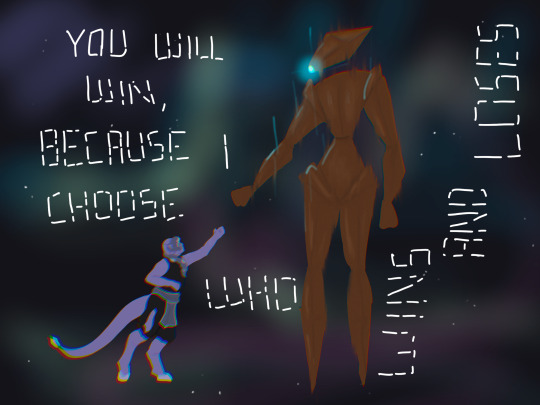
can’t wait to find out what the hell this means 🙃
2 notes
·
View notes
Text
OKAY SO BASICALLY
instead of Elune putting her “most favored children” through figurative and literal hell (first one intentionally, second one not so much), I am officially declaring Blizzard’s canon explanation Stupid As Shit and will instead propose an alternative as to why she didn’t prevent Teldrassil from burning.

My PERSONAL HEADCANON alternative can be summed up as such: she literally just wasn’t paying attention.
Elune is not all-knowing or all-powerful. If she was, nothing bad would ever happen to anyone that worships her (because she is a KIND and LOVING person, a'ight). I’m also going to say that sentient beings (e.g. Sylvanas) have free will and act of their own accord in the Warcraft universe (generally). So I will propose that despite being incredibly powerful and seemingly having an influence that stretches between star systems if not galaxies, Elune is not all-powerful. She can only do so much, she can only be aware of so much. So, I’m choosing to believe that when Teldrassil burned, she was just… busy doing something else. Perhaps helping another moon-worshipping civilization somewhere, or ten moon-worshipping civilizations at the same time because her goddess brain is that big. Maybe the Jailer or one of his lackeys was specifically distracting her (meh?). Maybe she can only fully manifest her powers during certain phases of the moon, I dunno. But importantly for us, she just wasn’t watching over the night elves at that point in time.
When she is watching over a given civilization, she can and will intervene in whatever divine way she wants to help them out. I like to think gods in fiction are sort of… masters of the butterfly effect so to speak, so that’s how I envision this flavor of divine intervention.
And I do want to add that normally whenever Elune goes to the other end of the universe or whatever to do something else, everything is just fine when she checks back in on the good old kaldorei. It’s just that this time, it was like she gently set us down on the table before she went to go get groceries, and then when she got back (maybe earlier than she intended because she heard thousands of people crying out to her) we had somehow fallen on the floor and the table had also exploded.
I'm actually fine with A.) making the Winter Queen her sister, because gods being related to each other is pretty common in irl mythology, although I agree it demystifies her and what we have right now is about all I’m comfortable with (i.e. I will be ignoring any and all future attempts to demystify her). And I’m also fine with B.) keeping the Winter Queen's call for help, but it only coincidentally happened at the same time as the burning. Not sure how I feel about the idea that Elune didn't know about the whole "every soul is being siphoned into hell" thing though. Granted, I don't think we have a specific time for when the Arbiter got broken, only that it happened before the Fourth War. So maybe if it happened just before Teldrassil burned, I suppose I could accept that Elune didn't know at the time.
Then again, I did see someone on Twitter say that it's also not great that Elune didn't CHECK to make sure the souls got to Ardenweald, which eeehhhhh yeah. Of course you could say that death working as intended was just taken for granted before now so it's kind of a "well, why WOULD she check" sort of thing. But anyway.
Also with this explanation I’ve come up with, it makes sense for why she’d give Tyrande the Night Warrior powers. Because with canon... it does not make sense. Just flat-out.
If you wanna go with this idea or a modified version, you and/or your character can absolutely choose to believe this means Elune is negligent or unreliable. I might go that way with Cathala honestly lol
But anyway those are my thoughts and I will now be accepting this all as canon <3 It's the best explanation I can come up with.
Oh also in my version of events Sylvanas died at the battle of Ardenweald so it makes a bit more sense for Tyrande and everyone else to be like “…okay, what’s next.”
TL;DR The War of Thorns happened and Teldrassil burned because Elune just chose the absolute worst time to not pay attention.
#9.1 spoilers#this is way longer than it really needs to be but that's because i'm neurodivergent baby and i need to say everything exactly#that tag in and of itself is a prime example#warcraft#world of warcraft#night elf#kaldorei#elune#teldrassil#au lore
20 notes
·
View notes
Text
Your Reputation Precedes You
A response to “On Fandom Racism (and That Conlang People Are Talking About)” because lmao that cowardly bitch just hates getting feedback from people that she can’t then harass into oblivion
i.e. God I Wish I Could Use The Tag Fandom Wank Without The Titty Police Nerfing My Post
-
To be frank, I'm not here because I think you or any of your little cronies are going to change your minds. If the 'name' wasn't a giveaway, your group of ~likeminded individuals~ have quite the reputation for espousing ableist, antisemitic, and, yes, racist views under wafer-thin the veneer of "calling out racism." I think we both know that what you're actually doing is using the relative anonymity of the internet and progressive language to abuse, harass, and bully fans that you personally disagree with. You and your group are toxic, hateful, and utterly pathetic, using many peoples' genuine desire to avoid accidentally causing harm and twisting it into this horrid parade of submissiveness to You, The One And Only Arbiter Of Truth And Justice In Fandom. Never mind that you have derided autistic people as lacking compassion and empathy, that you've used racist colonizer dogwhistles to describe a fictional culture based heavily on real live Maori culture, that you've mocked the idea of characters having PTSD, or that vital mental health services are anything more than "talking about your feelings with friends uwu." Let's just ignore that you have ridiculed the idea of adults in positions of power exerting that power over children in harmful and abusive ways, that creating transformative fan-content that doesn't adhere to the spirit of canon or wishes of the original author garners derision and hatefulness from you, and that you've used classic abuser tactics in order to gaslight people in your orbit into behaving more submissively towards you in order to avoid more verbal abuse.
Let's toss all of that crucial context aside in favor of only what you've written here.
What you've written here is nearly 3,000 entire words based on, at best—though, admittedly, based on your previous behavior, I am actually not willing to extend to you an iota of good faith—fallacious reasoning. You posit that a constructed language, to be used by a fictional religious group located in an entirely different galaxy than our own, is othering, racist in general, and anti-Asian specifically. This appears based in several suppositions, the first being that a language unknown by the reader will, by nature, cause the reader to feel alienated from the characters and therefore less sympathetic, empathetic, and caring towards the characters. That idea is patently ridiculous and, I believe, says far more about your ability to connect to a character speaking an unfamiliar language than any kind of overarching truth about media and the human condition. New things are interesting; new things are fun; the human brain is wired from birth to be fascinated with new things, to want to take them apart, find out how they work, and enjoy both the process and the results.
The second supposition this fallacy is based upon appears to be that to move away from the blatant Orientalism of Star Wars is inherently anti-Asian. While I find it... frankly, a little bit sad that you cling so viciously to the Orientalist, appropriative roots of Star Wars as some form of genuine representation, that's really none of my business. If you feel that a Muslim-coded character bombing a temple and becoming a terrorist and a Sith, a white woman wearing Mongolian wedding garb, a species of decadent slug-like gangsters smoking out of hookahs and keeping attractive young women chained at their feet (as it were), a species of greedy money-grubbers with exaggerated features and offensively stereotypical "Asian" accents, and an indigenous people wearing modesty garb based on the Bedu people and treated by most characters as well as the narrative as mindless animals deserving of murder and genocide are appropriate representation of the many, varied, and beautiful cultures around the world upon which they were "based," then that is very much your business. Until you pull shit like this. Until you accuse other fans, who wish to move away from such offensive coding and stereotypes, of erasing Asian culture from Star Wars. Then it becomes everyone's business, especially when you are targeting a loving and enthusiastic group of fans who are pouring their hearts and souls into creating an inventive and non-appropriative alternative to canon.
Which leads into the third supposition, that a patently racist, misogynistic white man in the 1970s, and then again in the 1990s, intended his universe to be an accurate and respectful portrayal of the various cultures he stole from. I understand that for your group of toxic bullies, the term "Death of the Author" holds no real meaning, but the simple fact of the matter is that George Lucas based his white-centered space adventure on Samurai movies while removing the cultural context that gave them any meaning, because he liked the idea of swords and noble warriors in space. He based the Force and the Jedi Order on belief systems such as Taoism and Buddhism, but only on the surface, without putting any real effort into into portraying them earnestly or accurately. He consistently disrespected both characters of color and characters coded to be a certain race, ethnicity, culture, or religion, and likewise disrespected and stole from the cultures upon which he based them. He was, and continues to be, a racist white man who wrote a racist story. His universe has Orientalism baked into its every facet, and the idea that fans who wish to move away from this and interrogate and transform the text into something better than what it is are racist is not only laughable, but incredibly disingenuous and insidious.
As I said, I am not writing this to change your mind, because I truly believe that you already know that "cOnLaNgS aRe RaCiSt" is a ridiculous statement. The way you've comported yourself in fandom spaces thus far has shown to me that you are nothing more than a bully who knows that the anti-racist movement in fandom can be co-opted for your benefit. If you tout your Asian heritage and use the right language, make the "right" accusations and take advantage of white guilt and white ignorance, you can have dozens of people falling at your feet, begging for forgiveness, for absolution. And I think that gives you a thrill. So, no, none of this will change your mind because none of this is genuinely about racism—it's about power, it's about control, it's about fandom being the only space where you have some.
So I'm writing this for the creators of this wonderful conlang, which has been crafted by multiple people including people of color, who don't deserve this nonsensical vitriol, and for the fans reading this manipulative hate-fest, wondering if they really are Evil Racists because they don't participate in fandom the way you think they should.
Here it is: fandom has a lot of racism, antisemitism, misogyny, queerphobia, ableism, etc. baked into it. Unfortunately, such is the nature of living and growing up in societies and cultures that have the same. The important thing is to independently educate yourself on those issues and think critically about them—not "think critically" as in "to criticize" them, but to analyze, evaluate, pick apart, examine, and reconstruct them again in order to come to a well thought-out conclusion. Read this well-articulated attack on a group of fans who have always welcomed feedback and participation, are open about their backgrounds, their strengths and weaknesses, and wonder who is actually being genuine.
Is it the open and enthusiastic group who ask for the participation of others in this labor of love? Or is it the ringleader of a group of well-known bullies who have manipulated, gaslit, and then subsequently love-bomb people who did not simply roll over at the slightest hint of dominance? The ones who spent hours upon hours tearing apart, mocking, deriding, and falsely accusing authors of fanworks and metatextual works of various bigotries and -isms, knowing that those evaluations were spurious and meant only to cause harm, not genuine examinations of the works themselves or even presumed authorial intent. The ones who made their own, quote-unquote, community so negative and toxic that even after the departure of a large portion of them, including this author in particular, that community still has a reputation for being hateful, toxic, and full of mean-spirited harassers who will never look critically about their own behavior but only ever point fingers at others. The ones who are so very determined to cause misery wherever they go that as soon as their usual victims are no longer immediately available, they will turn on each other at the slightest hint of weakness.
This entire piece of (fan)work is misinformed at the most generous, disingenuous at the most objective, and downright spiteful when we get right into it. The creators of Dai Bendu, along with various other works, series, and fan events that these people personally dislike, have been targeted because it is so much easier to harass, bully, and use progressive language as a weapon against them, than it is to put any effort into making fandom spaces more informed, more positive, more respectful.
As someone rather eloquently put it, community is not a fucking spectator sport. You want a better community, you gotta work at it. And conversely, what you put into your community is what you'll get out of it. This author and their friends have put a lot of hate into their communities, and now they're toxic cesspools that people stay well away from, for fear of contracting some terrible form of harassment poisoning.
Congrats, Ri, you've gotten just what you wanted: adoring crowds listening to you spout your absolutely heinous personal views purely to live out some kind of power fantasy, and the rest of us staying well away, because fuck knows nothing kind, helpful, or in good faith has ever come from Virdant or her echo-chamber of petty, spiteful assholes.
No love, bad night.
P.S. Everyone actually in the Dai Bendu server knows your ass got kicked because you didn’t say shit for a full thirty days and ignored the announcement that inactive members would be culled. You ain’t cute pretending like it’s because you were ~*~Silenced~*~ after ~*~Valiantly~*~ attempting to call out racism. We see you.
#fandom bullshit#fandom racism#fandom harassment#fandom ableism#fandom antisemitism#fandom misogyny#by apples
123 notes
·
View notes
Text
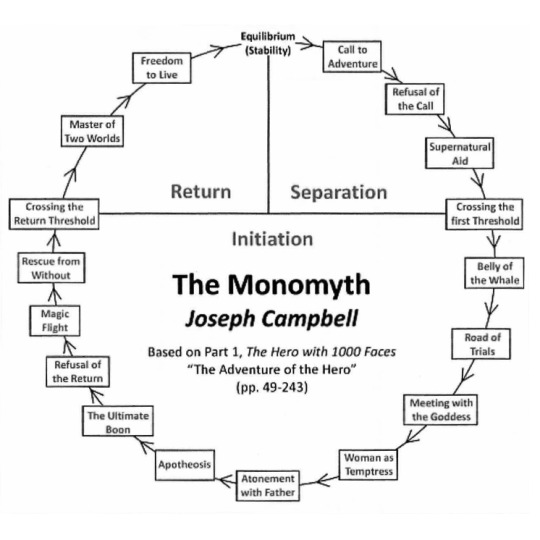
I think in my hurry to get through the one core rant without getting distracted, I didn't actually outline the Hero's Journey's whole proposed psych model in the first place. I don't want to get too into each of the 17 steps, but the idea of the process it reflects is this:
A boy on the cusp of adulthood must leave the comfort of parental protection/provision, whether he wants to or not. He must seek out the "magic" of an older mentor who has seen and mastered the unknown, and through that mentor they learn an entry level skill that will allow them to navigate the world of adults; but this is not "mastery" and it is not "understanding" it is only the bare bones functionality of mimicry. Understanding comes later. This happens, often, while still in the comfort of the "home" realm, where the dangers of the unknown aren't in play yet. Then they leave for real and confront the shock of an unfamiliar world, of autonomy, and responsibility; for the first time in their life, if something goes wrong, no one is there to help them.
Campbell himself posits this next step can go a few different ways. His standard format suggests the Belly of the Whale, the descent into the darkness of not knowing happens at the threshold itself, comes first. That upon confronting the unfamiliar new reality of adulthood the immediate reaction is to be overwhelmed, and only after addressing that immense pressure and aimlessness does the boy get to proceed out into the world at large with the understanding that out here, he can actually die.
But the alternative to this is that the boy goes from the crossing of the threshold directly into the Road of Trials, putting at his his magic aide's skills to use, and learning new ones, until that momentum of that growth and learning plateaus, and then THAT is the moment in which the hero is consumed unto the Belly of the Whale, not when he first confronts a reality that is beyond him, but when he first realizes that it's beyond him; when the arrogance and ignorance of youth gives way to humility. Here he has been facing danger and challenge but only now does he confront the inevitability of death; he cannot keep conquering the unknown forever.
I prefer the Belly-second format, because unlike the Belly-first form's processing of the idea that he can die, this is the fact that he will die; and then what legacy does he leave behind? And this directly motivates his shifting attention toward...
The Goddess Reconciliation is my problematic fav of this whole thing... Campbell and Jung believed deeply in this old fashioned notion of Anima and Animus, that there was some nearly mystical bioessentiallist quality of explicitly segregated Male and Female psyche, and a lot of that doesn't scan great these days. BUT! Of note is that their fixation on this duality came largely out of the idea that the two, being innately separate and at odds, needed to be balanced for a healthy mind to exist. In the psychospiritual spiritual approach to myth this means the Goddess is in fact a man's inner feminine aspect that need to be appeased and made peace with. And that's actually pretty cool, weird inner-cosmological premise to that aside.
But in regards to the myth as guidance, this is also the step in the journey that I just call Respect Women. Because that's what's being taught. This is the moment that the young boy/young man, until recently high on his own power and accomplishments, and his ongoing conquest of the unknown is confronted by a woman of great power. She resides in a realm above him, and for the first time in his quest he cannot conquer his way through this. He MUST speak with, negotiate, and empathize with this woman and her needs in order to win her favor and approval, and sometimes very literally hand in marriage.
This power she holds over him is often pretty literally the ability to have children, tying back into the newfound need to secure legacy that I mentioned in Belly of the Whale. But it can also be inheritance of fortune, positions of power and rulership, etc... in the realms of mythological and fairytale narratives. But it also reflects the internal idea of the joining of Anima and Animus, in that this marriage in one way or another, material or not, must bring him peace of mind.
Then there's the Woman as Temptress phase, which is woefully underused. Granted it can come across as a bit sexist and cliche in many narratives, and it's easy to see how that doesn't feel "essential" to most Hero Journeys, but I think this is incredibly important. Again, I prefer the Belly-second model in which the hero's conquests naturally lead to arrogance (he's on a winning streak, and he is still just a kid doing all this for the first time; he's never known defeat, so how does he even know when to slow his roll?) and this is a repeat of that; he's learned to please one woman, why not use his tried and true method of learning new skills and putting them to use to please more women? And so his loyalty to his Goddess must be tested in order to teach him moving forward.
This is the trope about Prince Charming being a playboy because his only trait is seducing women, not being good to them --see: Utena's Touga, or Into The Wood's Prince brothers. This is where a man learns not to be a fuckboi.
And then the confrontation with The Father. The legendary big Vader moment. But it's not always a violent confrontation, and it's not always innately negative; at times it can even be a somber affair. A boy must learn to stop idolizing his father, and make peace with the truth that his father is just a man, full of flaws like any other. And by reconciling his father as infallible patriarch and the hero's own process of growth, a boy must learn that to succeed in life he must be more than his father is/was. And this tends to become a violent or literal physical conflict when the father in question is both still alive, and the very literal authority that must be overcome in the name of progress. The patriarch has established a system of order that he sees as preserving the safety and security of the world of the known, and he will protect that system even as it begins to fall apart. And as a man, not longer a boy, but a peer to his father the hero has to show the father that he is no longer the unquestioned arbiter and effectively take his place.
In this the boy becomes man, hero attains some kind of enlightenment, sees some deep truth to the world and now knows with some clarity what is best for the world. An arrogant assertion to be sure, but internal to the journey at hand it makes enough sense... Because with this understanding the Hero also discovers or distills the mysteries of this wild realm of the unknown into The Ultimate Boon: a tool or a symbol of the skills learned, that can be replicated or utilized even without the hero's personal level of understanding. And this thing must be delivered back to the mundane so that the next generation of children can use it to expand their realm of the known further into what had before been unknown; each subsequent generation of hero expanding the collective knowledge and understanding of the community as a whole.
And Hero must also often learn selflessness. This kind of comes into play more often when there isn't the innate establishment of a desire to foster a legacy that will out last him. In this case the Hero needs to be talked into going home, because the alternative is that he continues to dwell in this state of perfection. But if he lives out his life like this, he will die as just a singular man rather than the Hero of a people. This in turn motivate the Rescue in which someone has to break into his little bubble of personal accomplishment to bring him back. Yet again his ego must be tested, and he must be humbled.
And then he goes back home, he's a Master of Two Worlds, the known and unknown alike, and he delivers The Boon to the common people so their lives can be made better by it. He earns the Freedom to Live and melds back into a mundane civilian life, as a productive member of his society, as a father, and eventually as a new hero's Magical Aide and old wizened mentor.
Shit.. I let this get away from me and shifted my whole rhetoric halfway in... >:/ My point wasn't to outline the mythic structure but the psychological one. So let me try to just summarize briefly now:
A boy needs to leave the comfort of home. He has to learn many new skills, starting with being taught by a teacher. He has to learn his limitations, finality and fatality. To secure a legacy he seeks a wife; to get a wife he must respect women; to keep a wife he must not be a fukboi. He must be a better father than his was. He must learn to want to give back to his community, and then return with knowledge and/or resources to better said community. He assumes a mundane life, he has kids who will grow up as he did; he'll be their father to overcome, and their mentor to learn from in time.
↑This is the Hero's Journey that Campbell became so fixated on, and that George Lucas maybe kind of oversold and muddled with film savvy, but that the original Star Wars still managed to embody and launch into the public consciousness. This is the Hero's Journey I wish more people would talk about and engage with, rather than the color-by-numbers nonsense that it's been reduced to.
6 notes
·
View notes
Text
Book Review: ‘At Night, I Become a Monster’

At Night, I Become a Monster by Yoru Sumino
My rating: 5 of 5 stars
To witness the struggle within is to validate the sealing of one's own coffin, and to realize the seal is often tighter than one suspects. Such is the case for a student, Adachi-san, and the array of young narcissists-in-training with whom he finds comfort. Is the disquiet and uncertainty wrought by one's inability to forgive too stifling to endure? Are the crude, juvenile behaviors of schoolyard bullies too predictable to pity? If the common kindness of a fellow classmate suddenly becomes cause for utter rebuke, why is silence so often construed as the best answer?
AT NIGHT, I BECOME A MONSTER, typical of Sumino's work, flickers a light into the pupil of a character whose sense of self and certainty demands further scrutiny. Of note here is the quarantining of emotion required of middle school and high school kids who participate in, witness, or endure extreme bullying. Adachi, the narrator, witnesses the daily endurance of a short, awkward, and socially clumsy girl -- Yano Satsuki -- as the weight of external disgust rises and falls like the tide. Yano-san's property is defaced, she is physically assaulted, she is verbally abused, and more.
And just as there is no easy answer for why the addled girl who has trouble reading the room endures her bullying, there is no easy answer for why her classmate, who witnesses these constant wrongdoings but does nothing to stop them, becomes a creature of incalculable darkness upon nightfall.
And yet, Yano always smiles, always keeps pushing forward. "Good . . . morning," she always says, her dialogue clipped.
And yet, Adachi keeps watching, keeps wondering, keeps scratching at the surface: "Why?"
AT NIGHT, I BECOME A MONSTER is all about asking questions for which there are no easy (or desirable) answers. Adachi's concern for the girl with the speech impediment who seems oblivious to the world around her is paramount ("Nothing I could say would get through to her [..] she was a girl who lived life at her own tempo," p. 52). Further, this wayward affection rivals the driving curiosity for the novel writ large: Every night, Adachi transforms into a shapeshifting beast with eight eyes, six legs, and four tails. And just as there is no easy answer for why the addled girl who has trouble reading the room endures her bullying, there is no easy answer for why her classmate, who witnesses these constant wrongdoings but does nothing to stop them, becomes a creature of incalculable darkness upon nightfall.
Self-awareness, somewhat ironically, is made most obvious when glimpsed through another person's perspective. In AT NIGHT, I BECOME A MONSTER, Adachi's anxiety and agony over his temporary, monstrous new form is given a delightfully perplexing new food for thought: What if the monster at night isn't a transformation at all? That is to say, what if the monster is who he truly is?
Adachi stumbles into a friendship with the mumbling Yano. In the evening, at school, when it's dark and quiet and one can hear oneself think, the two chat about Miyazaki films, cell phone games, and pop music ("I think I had genuinely begun to take some sort of strange interest in this even stranger classmate of mine," p. 189). He still ignores her during the day, to preserve the false "circle of unity," he has contrived to absolve himself of feeling guilty for her bullying. But the more time Adachi spends with the girl, he comes to realize the stumbling, smirking, speech-delayed maelstrom that is Yano is more in tune with herself than anyone else is with their selves. She is not slow, she is patient. She is not dumb, she is cautious. She is not smug, she is persistent.
The novel isn't merely narrated by Adachi but is heavily guided (biased) by his emotional state of mind. The author's decision to ride out the uneven emotions of a teenage boy unsure about life, kindness, responsibility, and all the rest forces the novel to pitch and shake like a vessel on the open sea.
In other words, AT NIGHT, I BECOME A MONSTER is less a bargaining of what one prides in favor of what one derides than it is, in the end, a quest toward exposure.
The boy is angry at his classmates for abusing the girl (and he is angry at himself for not helping her). The boy is bemused at why his classmates flock to a quiet girl, Midorikawa, whom Yano offended so long ago (but he refuses to prod for details). The boy manufactures alliances and treaties and betrayals in the span of a moment, believing himself the arbiter of reality without ever actually consulting his own, muted heart ("a flaw in my disposition," p. 218).
Dramatic irony is nowhere to be found in much of Sumino's oeuvre for the simple reason that many of these characters -- as prone to misfortune as they are to indecision -- only reach pacifying waters toward the end of their journeys. A difficult, startling, and ultimately sad truth.
In other words, AT NIGHT, I BECOME A MONSTER is less a bargaining of what one prides (communal approval) in favor of what one derides (outlier status) than it is, in the end, a quest toward exposure. For all its psychological drama and for all of its psychological/physiological horror, this novel is not really about understanding the favorable relative to the non-favorable; it's about discerning the internal constant that lies among both the favorable and the non-favorable.
Is the nighttime creature an external manifestation of the egotism and social avarice present within the boy during the day? Are the nighttime creature and the daytime animal both monsters, preoccupied with servicing different mentalities? Or is something else the monster? Something cruder, baser, and fare more fundamental to the bestial being that calls the mind home?
Light-Novel Book Reviews || ahb writes on Good Reads
#at night i become a monster#yoru sumino#diana taylor#review#light novel#5 of 5 stars#fiction#bullies too predictable to pity#external disgust rises and falls like the tide#constant wrongdoings#seven seas entertainment#april 2020#yano satsuki#quest toward exposure#alliances and treaties and betrayals in the span of a moment#nighttime creature#horror fiction#psychological realism#suspense fiction#communal approval#psychological horror#bullying#the boy is angry#socially clumsy girl
3 notes
·
View notes
Text
Rigis Philbin, Television Personality and Host, Dies at 88
— BY DAVID BAUDER | July 25, 2020







NEW YORK (AP) — Regis Philbin, the genial host who shared his life with television viewers over morning coffee for decades and helped himself and some fans strike it rich with the game show “Who Wants to Be a Millionaire,” has died at 88.
Philbin died of natural causes Friday night, just over a month before his 89th birthday, according to a statement from his family provided by spokesman Lewis Kay.
Celebrities routinely stopped by Philbin’s eponymous syndicated morning show, but its heart was in the first 15 minutes, when he and co-host Kathie Lee Gifford — on “Live! with Regis and Kathie Lee” from 1985-2000 — or Kelly Ripa — on “Live! with Regis and Kelly” from 2001 until his 2011 retirement — bantered about the events of the day. Viewers laughed at Philbin’s mock indignation over not getting the best seat at a restaurant the night before, or being henpecked by his partner.
“Even I have a little trepidation,” he told The Associated Press in 2008, when asked how he does a show every day. “You wake up in the morning and you say, ‘What did I do last night that I can talk about? What’s new in the paper? How are we gonna fill that 20 minutes?’”
“I’m not gonna say it always works out brilliantly, but somehow we connect more often than we don’t,” he added.
“One of the greats in the history of television, Regis Philbin has passed on to even greater airwaves,” President Donald Trump said in a tweet. “He was a fantastic person, and my friend.”
Ripa and her current partner, Ryan Seacrest, called Philbin “the ultimate class act, bringing his laughter and joy into our homes every day.”
“There are no words to fully express the love I have for my precious friend, Regis,” Gifford said Saturday on Instagram. “I simply adored him and every day with him was a gift.”
The tributes flooding in over social media read like blurbs for a movie Philbin would promote: “Always made me laugh” — Tony Bennett. “One of a kind” — Henry Winkler. “A lovely man” — Rosie O’Donnell. “His wit was only surpassed by his huge heart” — Meredith Vieira. “As wonderful a man as he was talented” — Paul Reubens, also known as Pee-Wee Herman. “You were the best” — LeVar Burton.
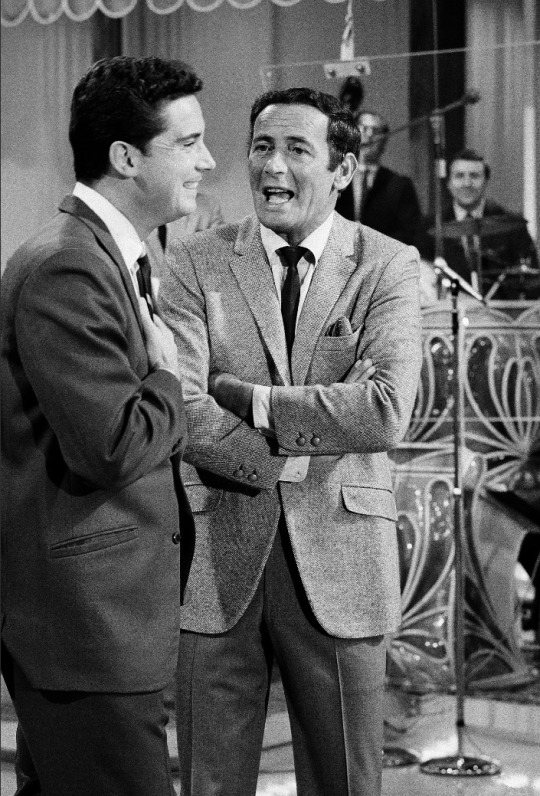
After hustling into an entertainment career by parking cars at a Los Angeles TV station, Philbin logged more than 15,000 hours on the air, earning him recognition in the Guinness Book of World Records for the most broadcast hours logged by a TV personality, a record previously held by Hugh Downs.
“Every day, you see the record shattered, pal!” Philbin would tell viewers. “One more hour!”
He was host of the prime-time game show, “Who Wants to Be a Millionaire,” briefly television’s most popular show at the turn of the century. ABC aired the family-friendly program as often as five times a week. It generated around $1 billion in revenue in its first two years — ABC had said it was the more profitable show in TV history — and helped make Philbin himself a millionaire many times over.
Philbin’s question to contestants, “Is that your final answer?” became a national catchphrase. Philbin was even a fashion trendsetter; he put out a line of monochramactic shirts and ties to match what he wore on the set.
“You wait a lifetime for something like that and sometimes it never happens,” Philbin told the AP in 1999.
In 2008, he returned briefly to the quiz show format with “Million Dollar Password.” He also picked up the Lifetime Achievement Award from the daytime Emmys.
He was the type of TV personality easy to make fun of, and easy to love.
When his son Danny first met his future wife, “we were talking about our families,” Danny told USA Today. “I said, ‘You know that show Regis and Kathie Lee?’ And she said, ‘I hate that show.’ And I said, ‘That’s my dad.’”
Yet Philbin was a favorite of a younger generation’s ironic icon, David Letterman. When Letterman announced that he had to undergo heart surgery, it was on the air to Philbin, who was also there for Letterman’s first day back after his recovery.
Letterman returned the favor, appearing on Philbin’s show when he went back on the air in April 2007 after undergoing heart bypass surgery.
In the 2008 AP interview, Philbin said he saw “getting the best out of your guests” as “a specialty. ... The time constraints mean you’ve got to get right to the point, you’ve got to make it pay off, go to commercial, start again. Play that clip. Say goodbye.” He gave his desktop a decisive rap.
“And make it all conversational.”
Regis Francis Xavier Philbin grew up in the New York borough of the Bronx, the son of Italian-Irish parents and named for the Roman Catholic boys high school his dad attended. He went to Notre Dame University, and was such an enthusiastic alum, he once said he wanted his ashes scattered there.
After leaving the Navy in 1955, Philbin talked his way into a meeting with the stationmaster at KCOP-TV in Los Angeles. He got a job parking cars, then progressed into work as a stagehand, courier, newswriter and producer of a sports telecast. When its sportscaster didn’t show up one day, Philbin filled in.
Philbin got far more on-air experience in San Diego in the early 1960s, when KOGO-TV began producing “The Regis Philbin Show” for a national audience. The program of music and celebrity interviews was taped two weeks before each airing. It was canceled after four months.
In 1967, Philbin was hired as the announcer and sidekick to comic Joey Bishop on his network show. When he heard that he was going to be fired because of poor ratings, Philbin tearfully announced he was leaving on July 12, 1968, walking off during a live broadcast. He returned three days later after letters of support poured in.
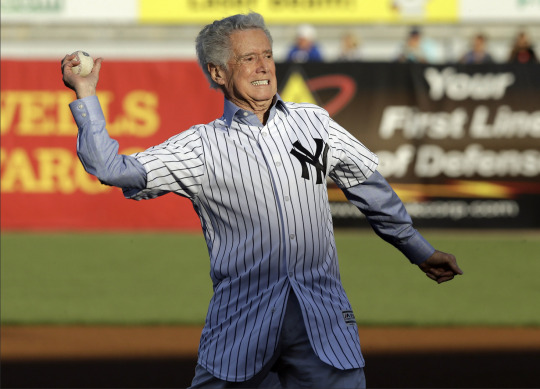
He and Bishop had bad blood: Bishop called Philbin an “ingrate” for walking off during a salary dispute and later badmouthing him.
Philbin’s second wife, Joy, was Bishop’s assistant.
After three years of commuting to St. Louis each week for a local Saturday night show, Philbin became a star in local morning television — first in Los Angeles, then in New York. In 1985, he teamed with Kathie Lee Johnson, a year before she married former football star Frank Gifford, and the show went national in 1988.
Philbin’s “sarcastic playfulness” endears him to fans, Good Housekeeping magazine wrote in 2000.
“He’s the little guy protesting the injustices of life, from crime waves to paper cuts,” the magazine wrote. “The ranting is punctuated with Kathie Lee’s familiar cry of ‘Oh, Reege,’ uttered sometimes in sisterly sympathy and sometimes in teacherly admonishment.”
The gentle bickering and eye-rolling exasperation in Philbin and Gifford’s onscreen relationship was familiar to anyone in a long-lasting relationship.
“No arguments, no harsh words in all this time,” Philbin told a theater audience in 2000. “Well, there was the time I didn’t talk to her for two weeks. Didn’t want to interrupt her.”
Gifford left the show in 2000. After a tryout period for a replacement, soap star Ripa (“All My Children”) filled the slot.
The same hustler who parked cars in Hollywood worked just as hard to land the job on “Who Wants to Be a Millionaire.”
“I begged my way on,” he told People magazine. “There was a short list, and I wasn’t on it. I called my agent, and we made a full assault on ABC in L.A.”
The audience responded to Philbin’s warm, comic touch in the role. He later jokingly referred to himself as the man who saved ABC. It wasn’t complete hyperbole: ABC was suffering in the ratings before the game became a smash success. Forbes reported that two-thirds of ABC’s operating profit in 2000 was due to “Who Wants to Be a Millionaire.”
Philbin appeared to love every minute of it. Even the ultimate arbiter of hip, the MTV Video Awards, asked him to make an appearance.
“It’s better to be hot,” he told the AP. “It’s fun. I know this business. I was perfectly content with my morning show. People would ask me, ‘What’s next?’ There is nothing next. There are no more mountains for me to climb. Believe me when I tell you, all I wanted when I started this show in 1961 was to be a success nationally.”
The prime-time game burned out quickly because of overuse and ended in 2002.
Philbin enjoyed a side career as a singer that began when he sang “Pennies from Heaven” to Bing Crosby on Bishop’s show. He said a record company called him the next day, and he made an album.
Even though the series “Regis Philbin’s Health Styles,” on Lifetime in the 1980s, was part of his lengthy resume, Philbin had health issues. Doctors performed an angioplasty to relieve a blocked artery in 1993. He underwent bypass surgery in 2007 at age 75.
He’s survived by his wife, Joy, and their daughters J.J. and Joanna Philbin, as well as his daughter Amy Philbin with his first wife, Catherine Faylen, according to People.
Regis Philbin, American TV host who spent 17,000 hours in front of camera, dies of natural causes at age of 88
The New Yorker was paid $28 million a year in 2000, the most ever for a game-show host, and had a career lasting six decades.
— ABC.NET.AU
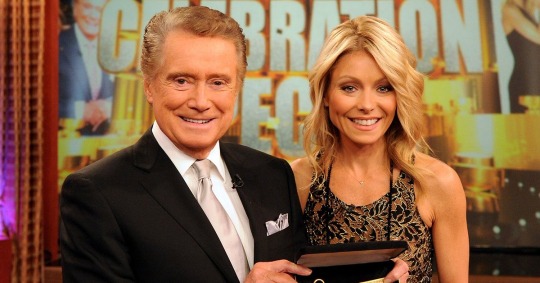
American TV host Regis Philbin, who logged more hours in front of the camera than anyone else in the history of US television on shows like Who Wants to be a Millionaire, has died aged 88.
Key Points:
Philbin died of natural causes, according to his family, one month before his 89th birthday
Guinness World Records listed Philbin as having put in about 17,000 hours on television
He was paid $28 million a year in 2000, the most ever for a game-show host
People magazine said Philbin died of natural causes one month before his 89th birthday, citing a statement by his family.
"His family and friends are forever grateful for the time we got to spend with him for his warmth, his legendary sense of humour, and his singular ability to make every day into something worth talking about," the statement said.
"We thank his fans and admirers for their incredible support over his 60-year career and ask for privacy as we mourn his loss."
Philbin was known for his rough edges, funny anecdotes, self-deprecating humour and a Bronx accent that was once described as sounding "like a racetrack announcer with a head cold."
American comedian and late-night host David Letterman, a long-time friend, called Philbin the funniest man on television.
Philbin, known to fans as "Reeg", was a fixture on various local and national shows for half a century with co-hosts including Kathie Lee Gifford and Kelly Ripa.
He hosted Who Wants to be a Millionaire when it debuted in the US in 1999, as well as other game shows.
His $US20 million ($28 million) a year salary in 2000 was the most ever for a game-show host.
Guinness World Records listed him as having put in more time on camera than anyone else in the history of US television — about 17,000 hours.
Philbin was perhaps best known as the host of the nationally syndicated talk show, Live! with Regis and Kathie Lee. It started in 1988, and became Live! with Regis and Kelly in 2001, running until 2011.
Jimmy Kimmel@jimmykimmel
Regis was a great broadcaster, a good friend and a tremendous amount of fun. He leaves behind a beautiful family and a TV legacy that will likely go unmatched. Regis, I hope our friend Rickles met you at the pearly gates with open arms and a slew of the insults you loved so much
Kelly Ripa Pays Tribute to Regis Philbin After His Death: 'He Was the Ultimate Class Act'
Philbin first made a name for himself in the 1960s with his own show on local TV in San Diego and then as a sidekick to comedian Joey Bishop on another program.
His biggest success came in the various incarnations of his nationally syndicated morning talk show that began in 1983 when he created The Morning Show for WABC in his native New York City.
After two co-hosts came and went, singer Gifford joined him in a highly successful collaboration in 1985, and in 1988 the program gained national syndication.
Gifford was his co-host for 15 years before Philbin was partnered with former soap opera actress Ripa for 11 years. Ripa remained as host of the show after Philbin departed.
"I think he is the world's greatest storyteller … that's his gift," Ripa said in 2011.
In 2001, he won a Daytime Emmy award as outstanding talk show host and claimed another Emmy for Who Wants to Be a Millionaire.
He also received a lifetime achievement Daytime Emmy award in 2008.
Philbin, who was born into an Irish-Catholic family in New York City, dealt with heart problems during his career and underwent triple-bypass surgery in 2007 at the age of 75.
Philbin married his second wife, Joy, in 1970 and remained married the rest of his life.
She sometimes co-hosted his national talk show with him when Gifford or Ripa were absent.
ABC/wires
3 notes
·
View notes